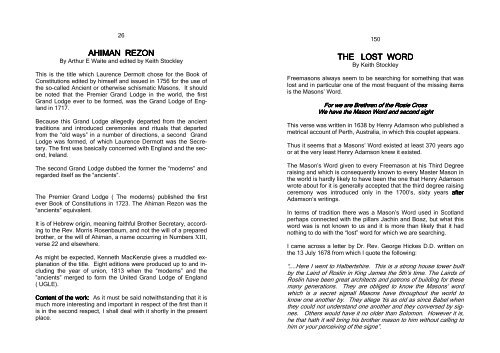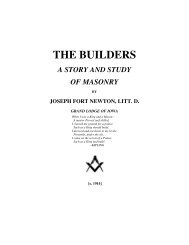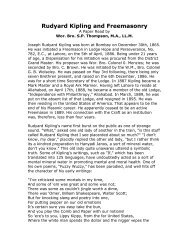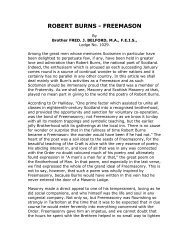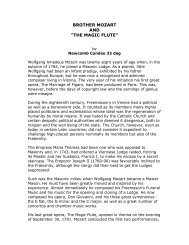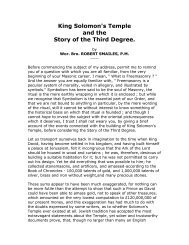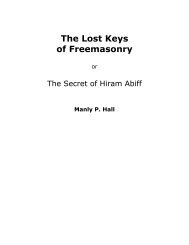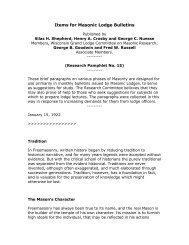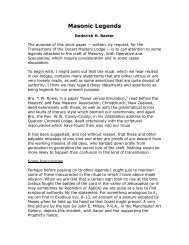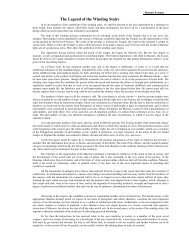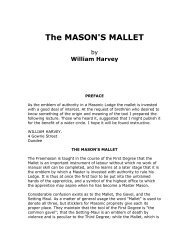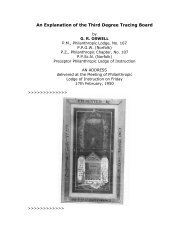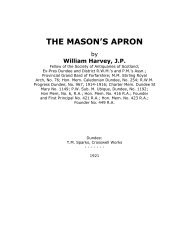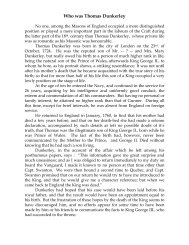Through the Key Hole - RoseCroix.org.au
Through the Key Hole - RoseCroix.org.au
Through the Key Hole - RoseCroix.org.au
You also want an ePaper? Increase the reach of your titles
YUMPU automatically turns print PDFs into web optimized ePapers that Google loves.
26<br />
AHIMAN REZON<br />
By Arthur E Waite and edited by Keith Stockley<br />
This is <strong>the</strong> title which L<strong>au</strong>rence Dermott chose for <strong>the</strong> Book of<br />
Constitutions edited by himself and issued in 1756 for <strong>the</strong> use of<br />
<strong>the</strong> so-called Ancient or o<strong>the</strong>rwise schismatic Masons. It should<br />
be noted that <strong>the</strong> Premier Grand Lodge in <strong>the</strong> world, <strong>the</strong> first<br />
Grand Lodge ever to be formed, was <strong>the</strong> Grand Lodge of England<br />
in 1717.<br />
Bec<strong>au</strong>se this Grand Lodge allegedly departed from <strong>the</strong> ancient<br />
traditions and introduced ceremonies and rituals that departed<br />
from <strong>the</strong> “old ways” in a number of directions, a second Grand<br />
Lodge was formed, of which L<strong>au</strong>rence Dermott was <strong>the</strong> Secretary.<br />
The first was basically concerned with England and <strong>the</strong> second,<br />
Ireland.<br />
The second Grand Lodge dubbed <strong>the</strong> former <strong>the</strong> “moderns” and<br />
regarded itself as <strong>the</strong> “ancients”.<br />
The Premier Grand Lodge ( The moderns) published <strong>the</strong> first<br />
ever Book of Constitutions in 1723. The Ahiman Rezon was <strong>the</strong><br />
“ancients” equivalent.<br />
It is of Hebrew origin, meaning faithful Bro<strong>the</strong>r Secretary, according<br />
to <strong>the</strong> Rev. Morris Rosenb<strong>au</strong>m, and not <strong>the</strong> will of a prepared<br />
bro<strong>the</strong>r, or <strong>the</strong> will of Ahiman, a name occurring in Numbers XIII,<br />
verse 22 and elsewhere.<br />
As might be expected, Kenneth MacKenzie gives a muddled explanation<br />
of <strong>the</strong> title. Eight editions were produced up to and including<br />
<strong>the</strong> year of union, 1813 when <strong>the</strong> “moderns” and <strong>the</strong><br />
”ancients” merged to form <strong>the</strong> United Grand Lodge of England<br />
( UGLE).<br />
Content of <strong>the</strong> work: As it must be said notwithstanding that it is<br />
much more interesting and important in respect of <strong>the</strong> first than it<br />
is in <strong>the</strong> second respect, I shall deal with it shortly in <strong>the</strong> present<br />
place.<br />
150<br />
THE LOST WORD<br />
By Keith Stockley<br />
Freemasons always seem to be searching for something that was<br />
lost and in particular one of <strong>the</strong> most frequent of <strong>the</strong> missing items<br />
is <strong>the</strong> Masons’ Word.<br />
For we are Brethren of <strong>the</strong> Rosie Cross<br />
We have <strong>the</strong> Mason Word and second sight<br />
This verse was written in 1638 by Henry Adamson who published a<br />
metrical account of Perth, Australia, in which this couplet appears.<br />
Thus it seems that a Masons’ Word existed at least 370 years ago<br />
or at <strong>the</strong> very least Henry Adamson knew it existed.<br />
The Mason’s Word given to every Freemason at his Third Degree<br />
raising and which is consequently known to every Master Mason in<br />
<strong>the</strong> world is hardly likely to have been <strong>the</strong> one that Henry Adamson<br />
wrote about for it is generally accepted that <strong>the</strong> third degree raising<br />
ceremony was introduced only in <strong>the</strong> 1700’s, sixty years after<br />
Adamson’s writings.<br />
In terms of tradition <strong>the</strong>re was a Mason’s Word used in Scotland<br />
perhaps connected with <strong>the</strong> pillars Jachin and Boaz, but what this<br />
word was is not known to us and it is more than likely that it had<br />
nothing to do with <strong>the</strong> “lost” word for which we are searching.<br />
I came across a letter by Dr. Rev. Ge<strong>org</strong>e Hickes D.D. written on<br />
<strong>the</strong> 13 July 1678 from which I quote <strong>the</strong> following:<br />
“…..Here I went to Halbertshire. This is a strong house tower built<br />
by <strong>the</strong> Laird of Roslin in King James <strong>the</strong> 5th’s time. The Lairds of<br />
Roslin have been great architects and patrons of building for <strong>the</strong>se<br />
many generations. They are obliged to know <strong>the</strong> Masons’ word<br />
which is a secret signall Masons have throughout <strong>the</strong> world to<br />
know one ano<strong>the</strong>r by. They allege ‘tis as old as since Babel when<br />
<strong>the</strong>y could not understand one ano<strong>the</strong>r and <strong>the</strong>y conversed by signes.<br />
O<strong>the</strong>rs would have it no older than Solomon. However it is,<br />
he that hath it will bring his bro<strong>the</strong>r mason to him without calling to<br />
him or your perceiving of <strong>the</strong> signe”.


